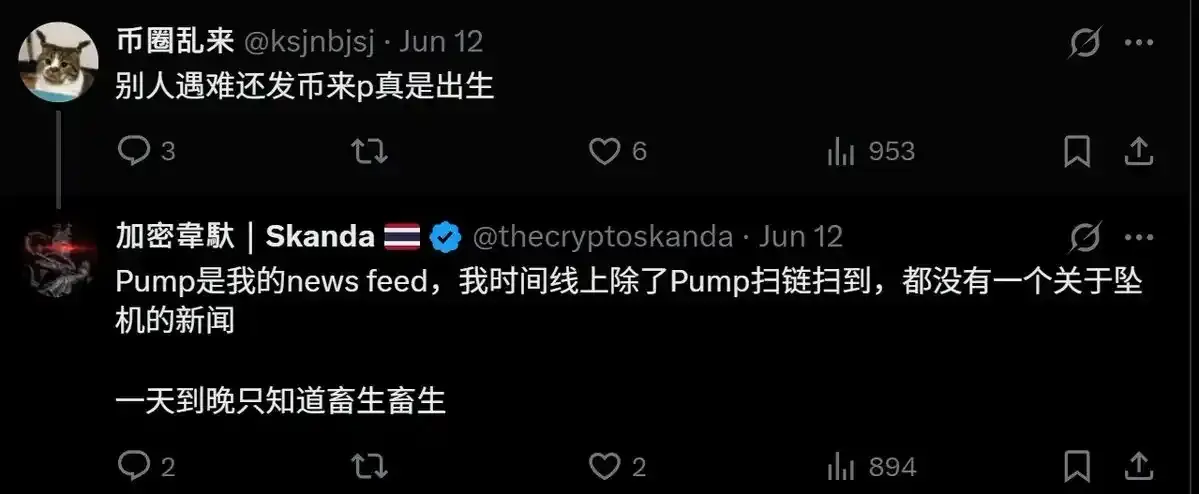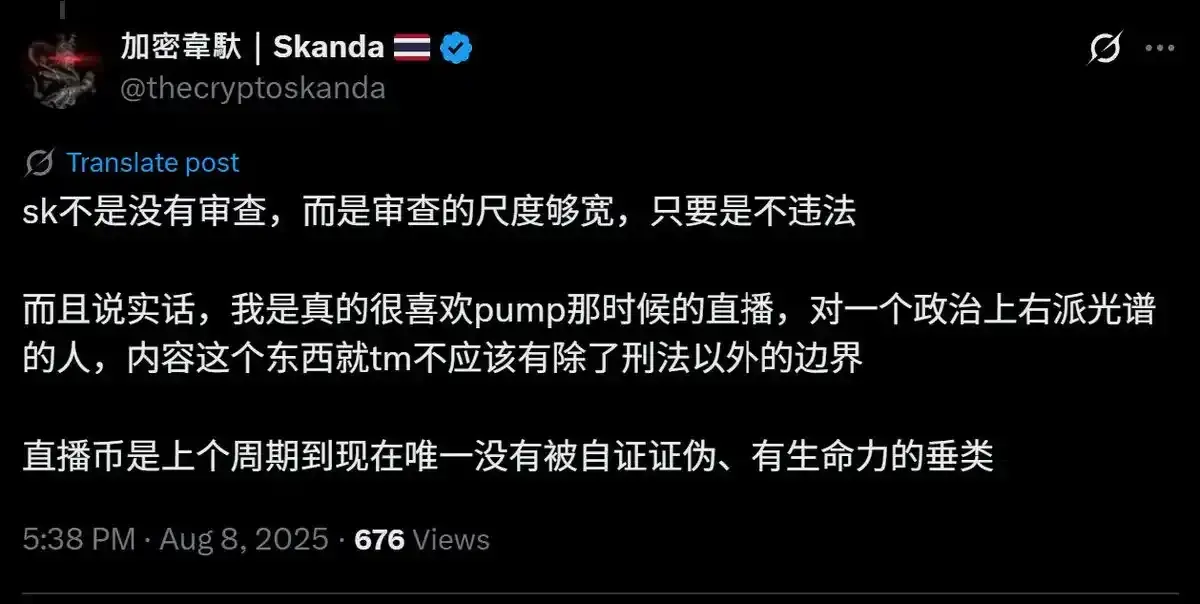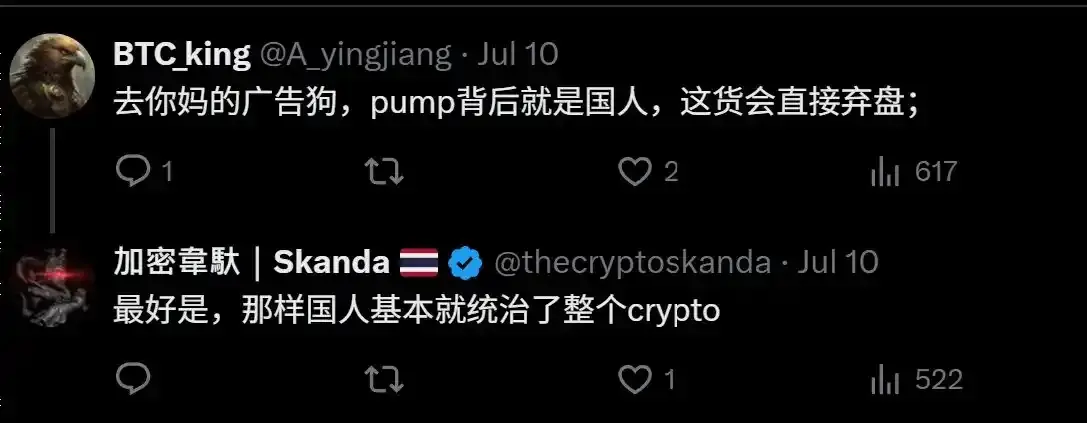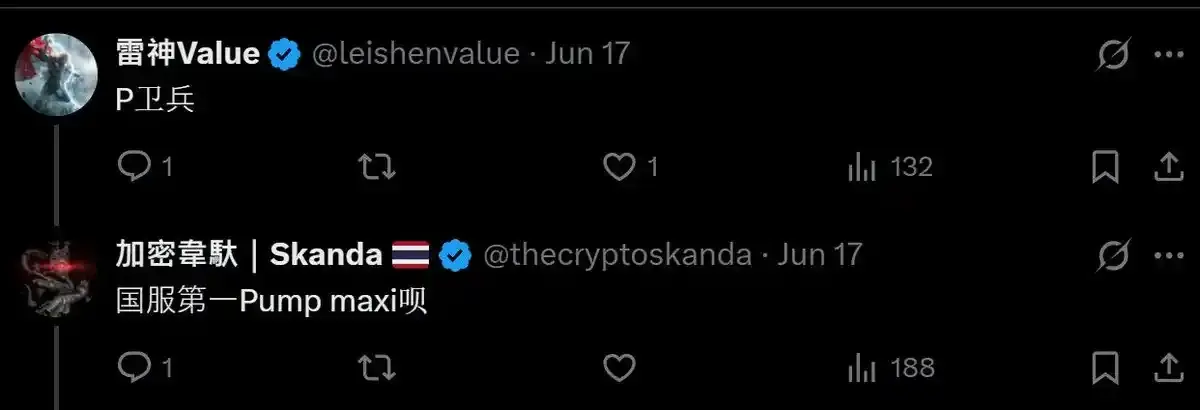Author: Crypto Weituo
In July, I was the top scholar in the Chinese crypto community while facing FUD from all over the internet, getting criticized for two months and blocked by thousands of people.

Pre-sale +27 +45 rolling positions to buy the dip, taking losses on long positions in between, and then going back in again, enduring significant losses with "spot doesn't fear," $Pump is the most painful coin in my two years of holding large positions. Now, I finally have phrases like "the great scholar has his own interpretations" and "the light boat has passed through ten thousand mountains," so I won't say things like "I already said that long ago."
In my view, the questions raised by the wizard regarding the Pump live-streaming game, as well as the majority of discussions about Pump in the Chinese community, fundamentally revolve around the understanding of Pump's audience.
TL;DR
Pump is right because he understood earlier than anyone else that this generation of young people is the "PVP generation";
Pump is a mass media phenomenon based on the values of the PVP generation, equivalent to Truth Social and Bluesky;
The game of live-streaming coins is no different from other coins, understood from the perspective of the track and ecosystem;
The reason Pump must do live-streaming coins is to capture Taker traffic from trading platforms;
The fundamental reason I am a Pump maxi is my deep understanding of the darkness of human nature and the inevitability of the world heading towards chaos;
Understanding the PVP Generation
For any market, the decisive factor is the audience.
Pump's biggest moat is his audience, which I referred to as the "PVP generation" in the open-source scythe 23, the generation born after 2005.
Why?
The traditional moats we talk about: liquidity, technology, compliance barriers, etc., are based on the economic theory of the "rational person" assumption—individuals in economic activities are self-interested and can rationally weigh pros and cons to maximize their economic benefits at the lowest cost. BTC mining games, DeFi, token economic models, etc., all operate under this premise.
Of course, in practice, not everyone can be a saint. The transmission of rationality is institutional; as long as the holders of discourse power among economic participants are "rational," these models basically still hold.
The problem lies here: the PVP generation is the first generation to grow up under the discourse power of social media.
The characteristics of this generation are:
Unlike our generation, they did not experience struggles for basic needs in childhood; they grew up without worries about food and clothing.
The influence of "non-rational amplifiers" like social media on them far exceeds that of rational education.
The vast majority of this generation in many countries have never experienced the global economic growth that their parents did; instead, they face a sharp reduction in job opportunities due to technological replacement and industrial transfer.
As a result, their cognitive style is "non-rational," based on labels rather than rational analysis.
Moreover, the proportion of the smartest individuals engaging in zero-sum industries has significantly increased, including finance, real estate, entertainment, and other service industries. The essence of these industries is to extract money from others' pockets and put it into their own, dividing the cake rather than making it.
If you don't believe it, you can see that over the past decade, the most profitable companies in China have all been shifting towards finance, and many highly educated individuals are now doing live-streaming or becoming internet celebrities. In the U.S., most young people lean left, focusing not on the right's "make America great again" approach of "making the cake," but rather on "social justice warrior" narratives of dividing the cake.
Zero-sum, which the previous generation viewed as harvesting leeks, has become the new normal for this generation. Therefore, it is meaningless to judge them using past universal morals and values.
They are indifferent to survival issues, and their understanding of achievement is "how many followers I have" or "how I go viral," rather than how to build a "business" like their parents did. They even disdain their parents' values.

Behaviorally, this generation may lack professionalism but possesses strong initiative, knowing how to purposefully "attract attention," detesting any judgment, even the slightest, and having a very low tolerance for delayed feedback, unable to endure delayed gratification.
The Core Moat of Pump
Pump's success primarily stems from understanding the demands of the PVP generation:
No moral judgment
Super timely feedback stimulation
Low barriers to entry
The latter two are addressed through product features, which many people claim "have no moat."
Thus, the core of Pump's brilliance lies in shaping a value system that does not adhere to traditional moral judgments; as long as you win and attract attention, you are impressive. Pump will never hypocritically tell you "community first," "long-term value," "the team has a vision," etc.
Even if you rug like $Quant's kid or $HANDS' no-hand brother, the official and community accounts will only treat you as a new meme to be edited into videos. There is no concept of rights protection in the entire Pump ecosystem.
There are also various news coins, political coins (even so-called "dead coins"), which might be censored on other platforms or even Twitter itself, making it impossible to monetize. But on Pump Fun, it is all possible.

Whether it's the devs or the trenches of the PVP generation, they hate being rug-pulled but hate being preached to even more, being told that what they participate in is "a scam, a beast, a harvesting of leeks." For the incels of the PVP generation, the trenches are the trenches, but being denied in terms of values is a visceral aversion.
Like it or not, values are the foundation of mass media.
Just as right-wing figures like old Deng detest being silenced on Twitter during Jack Dorsey's era, leading to the creation of Truth Social; left-wing figures like old Deng detest Musk's X, which they see as "Fascist Rhetorics," and thus move to Bluesky. People choose their echo chambers based on their value inclinations. The PVP generation feels that everyone else is old Deng, so they choose PumpFun.
If you ask me why I understand this so well, it might be because "understanding birth through birth."
The Game of Pump Live-Streaming Coins
Last year, during a conversation with friends, I clearly saw the potential of live-streaming coins and believed they were the only track last year that had not been falsified (Pump's interruption of live streaming was due to regulatory changes, not because it couldn't continue). This became a major reason I supported @Sidekick_Labs at that time.

Of course, the questions raised by the wizard were also very representative: web 2 is about tipping, so streamers are motivated to keep streaming to make money. Web 3 is about pouring in; if the streamer has already bought at the bottom, what’s the point of continuing to stream after the price drops? To earn trading fees? If a lot of coins go to zero, does the game keep getting pushed forward? Is the market cap getting lower and lower?
First, his game theory is correct, but it stands on a specific coin. If we consider the track, we need to think in reverse: if it’s not live streaming, would it be the same?
Whether it’s AI, Bonk’s CTO, or ICM promoted by Solana, or even not limited to on-chain launches, including exchange VC coins, devs have always had the advantage of not being held accountable; they can directly dump and leave.
The only factors that influence whether a team abandons a project are the initial costs and whether there is a continuous cash flow. The higher the initial costs and the continuous cash income, the less likely the project party is to abandon it. When I retweeted the PUMP ICO video on July 9, I said the same thing about Pump itself, and at that time, I was heavily criticized; many people thought Alon was a beast, so Pump would definitely rug.

Looking back now, is that the case? Similarly, if a streamer rugs once, they are unlikely to stream again; it’s a one-time deal. If they can continuously earn creator fees like Bagwork, why would they want to kill a cash cow?
Second, the live-streaming industry in web 2 is an industrialized system; streamers are just platforms (corresponding to the perspective of memecoins), and the real driving force is the buying of traffic, finding big backers, and the unions and arms dealers that wash the flow of funds. Streamers don’t take home much money.
Live-streaming coins are the same; the success of the coin mainly relies on market makers (MM). Streamers are unlikely to be MMs, so Pump is responsible for attracting wannabes, while MMs take on the responsibilities of the union.
There are two points here:
The most profitable part of a casino is not the gambling itself, but the flow of money, with a ratio of about 1:9;
For applications like ICM or AI, as an MM, you need to control a team; for live-streaming coins, you only need to control one person.
Why Must Pump Do Live-Streaming Coins?
This is Pump's wisest decision.
The lifeblood of traffic on the entire Solana chain does not lie in the platform but in the trading platform, specifically Axiom.
Solana can systematically smear Pump, encouraging VC funds to support Bonk or other platforms, pushing Useless, but cash flow and attention are two different things. Users trading either Bonk or Pump's coins do so through Axiom; no matter what story you tell, it’s all the same CA.
However, live streaming is different; the content of live streaming directly translates to K-lines. Placing orders while watching a live stream provides an asymmetric information advantage compared to watching Axiom's K-lines. Live streaming is not a specific narrative; it is a traffic carrier in itself. The order volume will genuinely tilt towards Pump.
Therefore, the key data for the next phase is to see whether Pump's front-end order volume can capture market share from Axiom, rather than looking at the ratio of Pump to other platforms.
Why Did I Support Pump So Early?

For quite some time, I was almost the only Pump Maxi in the Chinese community, and if I had to say why:
I have led a Dev team;
I have worked on a launchpad but was not successful, which helped me understand why other launchpads on Solana would fail, and I witnessed Pump's brilliance;
I got to know Pump's early investors early on, gaining firsthand insights and observing the working methods and logic of the Pump team from the front row;
I have spent a lot of time with young people;
I have been in the market for 10 years; perhaps I am not proficient in the secondary market, but I understand human nature and even more so the darkness of human nature. My fundamental understanding of the world is that it is heading towards chaos, and chaos is a ladder;
As I said, the Pump team is like sharks, reading Napoleon's conquests while sitting on the toilet.
Click to learn about ChainCatcher's job openings
Recommended reading:
Pantera Capital In-Depth Analysis: The Value Creation Logic of Digital Asset Treasuries (DATs)
Backroom: Tokenization of Information, a Solution to Data Redundancy in the AI Era? | CryptoSeed
免责声明:本文章仅代表作者个人观点,不代表本平台的立场和观点。本文章仅供信息分享,不构成对任何人的任何投资建议。用户与作者之间的任何争议,与本平台无关。如网页中刊载的文章或图片涉及侵权,请提供相关的权利证明和身份证明发送邮件到support@aicoin.com,本平台相关工作人员将会进行核查。




